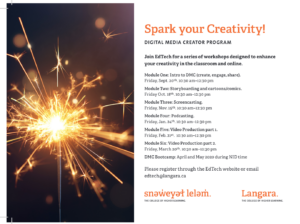There are many misconceptions about creativity. One is that it is the exclusive preserve of geniuses – think Mozart or Picasso. Another is that creativity is a genetic trait passed on within families (while partly true your environment still plays a major role in how creativity is expressed). A third is that it is the domain of teachers and students in creative arts subjects. Forget encouraging creativity in Math, Business or Physics.
The good news: researchers from Durham University argue that we all possess “small c creativity,” that is, the kind of creativity that encourages us to “think differently” in social circumstances (including teaching) and find new ways of doing and thinking about things (Davies and Newton, 2018). Sir Ken Robinson goes further; paraphrasing Picasso he argues that the education system stifles the artist within all of us and one of our jobs as educators is to take risks in order to nurture and spark our creative capacities.
Thanks to Robinson and people like Andrew Churches (2008) who reformulated Bloom’s Taxonomy for the digital age, creativity is now seen as an essential 21st century set of skills alongside those of literacy, numeracy, critical thinking and collaboration. The ability to adapt and remix, make, publish, build and construct are considered valuable higher order skills in the classroom but also increasingly in the workplace. A 2014 Adobe study of over 1000 hiring managers found that 94% look for evidence of creativity in job applications. In the classroom both teachers and students are expected to demonstrate a degree of digital fluency when it comes to creative higher order skills. Students in particular are being encouraged to move beyond a consumer model of education and instead co-create their learning experiences while as educators we are being told we should provide opportunities for our students to demonstrate multiple means of action, expression and communication.
The Digital Media Creator (DMC) Program
In EdTech our response to the need for more more creativity in the classroom and online has been to offer a program of professional development which we call Digital Media Creator. There are six modules: one a month from September through to March, focusing on creative practices such as podcasting, video production, screencasting and using cartoons/comics in teaching. We also offer an intensive DMC ‘boot camp’ where we cover all six modules in one week around NID time in early May. Each session is 90 mins long with an additional 30 mins “stay and play.” We aim to create an informal, stimulating and supportive learning environment in which to develop your creative skills, and we help you to create digital artefacts that you can use in your teaching. While we encourage you to sign up for all six modules you can also sign up for them individually depending on your interests and skill levels if you wish. Spots fill up quickly so you need to move fast!
References:
Adobe (2014) ‘Study reveals students lack the necessary skills for success.’ https://blogs.adobe.com/education/2014/09/29/study-reveals-students-lack-the-necessary-skills-for-success/ (retrieved September 04, 2019)
Churches, Andrew (2008) Bloom’s Digital Taxonomy. https://www.researchgate.net/publication/228381038_Bloom’s_Digital_Taxonomy (retrieved September 6, 2019)
Davies, Lucy M and Newton, Lynn (2018) ‘Creativity is a human quality that exists in every single one of us.’ https://theconversation.com/creativity-is-a-human-quality-that-exists-in-every-single-one-of-us-92053 (retrieved September 5, 2019)


